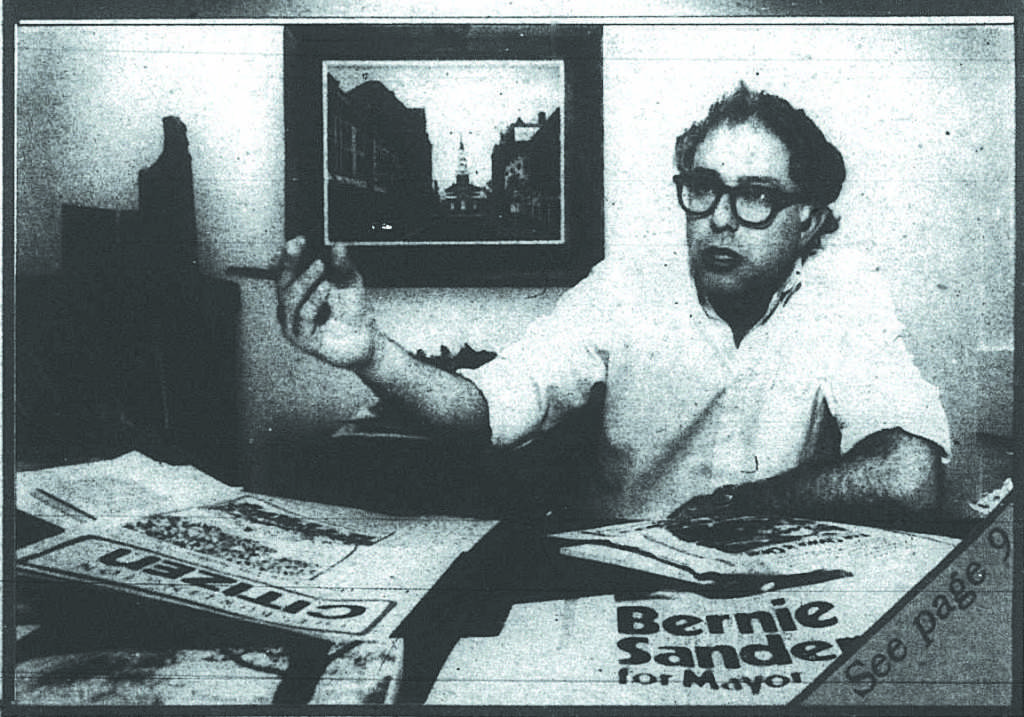Bernie Sanders on College Education
Follow @vermontcynic for updates. Follow the conversation at #berniefiles
Editor’s note: Since 1976, the Vermont Cynic has followed Bernie Sanders’ ascent to national politics, from his second campaign for governor to mainstream presidential candidate. After spending months reviewing our archives, as well as the archives at UVM, the Enterprise team at the Cynic is proud to present a series looking back at the coverage we have done on Sanders’ political career, bringing to light subjects and comments which have found new relevance given his current fight for the White House.

SEN. BERNIE SANDERS (I) has been endorsing tuition-free higher education for years and has made the issue part of his presidential platform. His well-known position is simple — in order for the United States to remain competitive, college needs to be more affordable.
However, his past positions on the value of a college education and his own experience in college tell a new story, revealing a more cynical view on the value of going to college.
Sanders’ statements to the Cynic “hold true today,” according to his spokesman Michael Briggs.
Sanders attended eleven semesters of college: three semesters at Brooklyn College in Brooklyn, New York from fall 1959 to the summer of 1960, and eight semesters at the University of Chicago from the fall of 1960 to the summer of 1964, where he graduated with a bachelor’s degree in political science, according to Brooklyn College and University of Chicago officials.
“I didn’t learn much from the classes I went to, or for that matter, didn’t go to at the University of Chicago,” he said, according to a February 1992 Cynic article. “I learned by participating.”
At a talk given in 1992 to UVM environmentalist student group VSTEP, Sanders characterized his time in college as being less important than the time he spent protesting while in school, suggesting that he skipped some of his classes.
“I didn’t learn much from the classes I went to, or for that matter, didn’t go to at the University of Chicago,” he said, according to a February 1992 Cynic article. “I learned by participating.”
In a 1983 interview with the Cynic, Sanders spoke candidly about how much he valued his education in college.
Cynic: “After college, where did you go from there?”
Sanders: “Well, I became exposed to ideas, met people who had experience in the trade union movement. I made contact with black people in the civil rights movement. I learned a lot, not so much from the books and classes.”
Cynic: “What did you study?”
Sanders: “I started off in political science and then I went to English and then I went to psychology — I was going to be a physician, I wanted to be a psychiatrist. I studied that, and then I went back to a degree in political science. What I learned there didn’t have any deep impression on me.”
The Vermont Cynic has covered Sanders’ political career since 1976. It was during his second campaign for governor on the Liberty Union Party ticket that he had his first interview with the Cynic, in which he suggested that education may contribute to the “aimlessness” of the youth.
“I would suspect that the majority of students who go to UVM or other schools are going primarily so that they can get some kind of decent job, either to make money or to have some kind of meaningful job,” he said. “I think the process of education itself does not particularly excite or motivate people. I think for the kids there’s no sense of purpose.”
“You have to ask yourself, ‘what kind of life do I want to live, is that what I want to do? Do I want to go out and make money for someone else? Is that all I want to do with my youth, go to a school to get good grades so I can get out and go to graduate school so that someday I can get a job or do I want to use my intelligence and my ability to do, you know, good things, to make this into a decent world?’” Sanders said.
“The focus of the universities becomes to basically educate you [the student] to fit into the system, not to orient you to try to change the system,” Sanders said.
On April 26, 1988, he took aim at all U.S. universities during a speech at the Living/Learning Fireplace Lounge.
“The focus of the universities becomes to basically educate you [the student] to fit into the system, not to orient you to try to change the system,” Sanders said, according to a Cynic article released later that week.
He also took aim at college trustees across America. He described the people who made them up as “almost without exception, large and successful businessmen and women” whose reward for doing well in life is that they can “make decisions determining your education.”
“Does society want you to be intelligent, creative, thoughtful people, or would it prefer for you to be nice cogs in the machine, doing what you are told to do? I would say the latter is true,” he said later in the speech.
In a Feb. 11, 1988 Cynic article on Sanders declaring his candidacy for the House of Representatives, he took aim at, what he viewed as, universities turning the youth into people who won’t resist the status quo.
“Is the University of Vermont a progressive institution, or does it really serve primarily the business interests … educating the young people to simply go out and work for corporate interests?” he said.
By the 1990s, he began to focus on college affordability. In a 1990 interview with the Cynic during his first bid for the House, Sanders, a democratic socialist, said the price of college in democratic socialist countries versus in the U.S. was an example of how people have the right to have not only “political freedom but economic justice.”
“In countries like Sweden and western Europe, students do not have to pay $20,000 a year to go to college. But, in fact, tuition is much, much cheaper in Canada. In Sweden it is free,” he said.
Sanders recently introduced legislation to make public colleges and universities tuition free, at the cost of roughly $70 billion. The plan would be paid for by imposing a tax on Wall Street transactions, according to his campaign website.
“We once led the world in the percentage of our people with a college degree, now we are in 12th place.” Sanders said in the press release. “Countries like Germany, Denmark, Sweden and many more are providing free or inexpensive higher education for their young people. They understand how important it is to be investing in their youth. We should be doing the same.”






